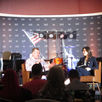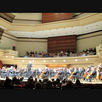New Philharmonic features Chicago Symphony Orchestra’s cellist Richard Hirschl
- Oct 18, 2018
- 5 min read

“I feel I shall live a long time,” said one of the greatest composers in history, Pyotr Ilyich Tchaikovsky. The composer lived only fifty three years, but his music, as well as the music of other world-renowned composers, keeps lighting up this world. New Philharmonic, the McAninch Arts Center’s own professional orchestra, delivers the beauty of classical music to the Chicago suburbs by performing timeless masterpieces and bringing to its performances talented guest artists. This time, New Philharmonic prepared a concert program that will feature Richard Hirschl, an acclaimed cellist from Chicago Symphony Orchestra. This exciting performance will take place at 7:30 p.m. on Saturday, November 3 and at 3 p.m. on Sunday, November 4 at the Belushi Performance Hall at the McAninch Arts Center in Glen Ellyn.
“Chicago Symphony Orchestra cellist Richard Hirschl, who is to be counted amongst a handful of the greatest cellists in all of Chicago, will be playing three ultra-romantic Russian pieces with us,” said Maestro Kirk Muspratt. Russian classical music keeps attracting the attention of musicians from all over the world. Its extreme inner depth, density of various emotions and feelings and extraordinary musicality challenge musicians not only in terms of their musical technique, but also in terms of their ability to express tremendous ideas that composers put in their music. Chicago Symphony Orchestra’s cellist Richard Hirschl is one of those musicians who feel the depth of Russian classical music and is ready to demonstrate it during his performances with the New Philharmonic Orchestra.

This concert program will start with Aria of Lenski (“Kuda Kuda”) from Tchaikovsky’s famous opera “Eugene Onegin.” “This is the heart crushing aria that Lenski sings as he is about to duel with his best friend knowing that one of them is to die in the next few moments,” noted Maestro Muspratt. “He asks not only ‘why’ but also ‘where has the springtime of life, of hope, of joy disappeared?’ The two best friends are dueling, of course, over a tragic misunderstanding involving a lady, Olga! Richard is obviously not going to actually ‘sing’ this aria. We have a transcription for cello and orchestra that is not played often at all. It is searing, compelling, wrenching. I have been waiting for years to program this piece for you.” The combined effort of the orchestra and the cellist will demonstrate the sensitivity and extreme sadness of this aria. The words will not be needed. The cello will tell the whole story.
The next masterpiece that will be presented during this concert program is “Vocalise” written by another giant of Russian classical music Sergei Rachmaninoff. It is the final song in his cycle of fourteen Romances, and it is the only one in the whole cycle that contains no words. “Vocalise” expresses extreme sorrow and melancholy, and the melody line is so tender and heartbreaking that the words are not needed. “The Rachmaninoff ‘Vocalise’ is one of the most gorgeous pieces of music in the solar system and we all adore it to smithereens,” noted Maestro Muspratt. “We know it most usually as a piece for soprano and piano or for soprano and orchestra. However, again Richard and I have a version of this for cello and he is going to set it on fire. I can promise you that you are going to fall in love with his playing of this Rachmaninoff.”
Another composition that will feature Hirschl is Tchaikovsky’s “Variations on a Rococo Theme” for cello and orchestra. This genuine and intimate composition is the composer’s nostalgic nod to the 18th century music that had always inspired him. The term “rococo” is usually related to an architectural style in France and to “asymmetrical patterns involving motifs and scrollwork.” Rococo found its place in music too. The melody line is usually light and gorgeous, but in Tchaikovsky’s Variations the “rococo” characteristics are just the cover of the real feeling that the composer meant to deliver – his nostalgia.
Technically provocative, this piece was the closest Tchaikovsky ever came to writing a full concerto for cello and orchestra. “This is a challenge for any cellist as Tchaikovsky wrote it in a most demanding manner,” noted Maestro Muspratt. However, nothing is impossible for such an outstanding cellist as Richard Hirschl who has been with the Chicago Symphony Orchestra for thirty years already. His appearance with the New Philharmonic Orchestra will become another gem in the palette of his outstanding concerto performances with numerous orchestras around the United States.
At the end of the first half of the concert the New Philharmonic Orchestra will please the audience with more of Tchaikovsky’s music – this time, with selections from his elegant ballet “The Sleeping Beauty.” It is difficult to believe, but Tchaikovsky during his lifetime never had the luxury of being able to witness his work become an instant success in theatres outside of Russia. And even in his own country he didn’t receive the honor that he deserved. It is said that “at the premiere Tsar Alexander III summoned Tchaikovsky to the imperial box. The Tsar made the simple remark ‘Very nice,’ which seemed to have irritated Tchaikovsky, who had likely expected a more favorable response.” However, shortly after his death, “The Sleeping Beauty” became one of the most popular ballets in the repertory of the Imperial Ballet. It has a rich structure and is full of different numbers, but this time the New Philharmonic chose to present the following selections: IV – Panorama, I – Introduction: La Fee des lilas, and II – Pas d’action.
After the intermission, the New Philharmonic will take a musical journey to Germany and present the music of one of the most recognized composers of all time – Ludwig van Beethoven. His Symphony No. 4 in B-flat major, Op. 60 is not one of his most famous compositions, but if you take a closer look at it you will fall in love with this symphony. It is important to understand that it was written when Beethoven couldn’t hear anymore. The composer was broke at that time and completely deaf already at the age of 36. Still, this composition is grazioso, beautiful and exciting. In the opinion of Maestro Muspratt, in this symphony Beethoven demonstrated a sense of humor and broke all the rules trying to cope with reality and find humanity by creating beauty.
“Music should strike fire from the heart of man, and bring tears from the eyes of woman,” said Beethoven. If you want to experience various emotions and feelings evoked by timeless classical masterpieces, come to the McAninch Arts Center at 7:30 p.m. on Saturday, November 3 and at 3 p.m. on Sunday, November 4 and hear cellist Richard Hirschl and the New Philharmonic Orchestra perform. For tickets, please call 630-942-4000 or visit http://www.atthemac.org/events/richard-hirschl/. Tickets are $49. The audience members are also welcome to attend a free pre-concert MAC chat and “Cookies with Kirk” post-performance lobby reception.
Natalia Dagenhart
Photo 1: Courtesy of The MAC
Photo 2: Courtesy of Richard Hirschl

























Comments